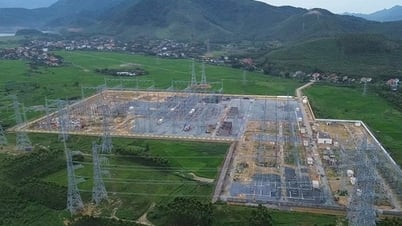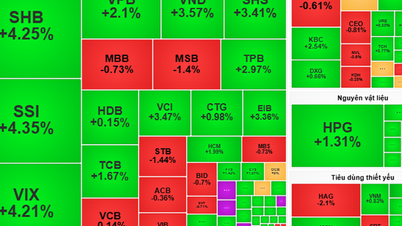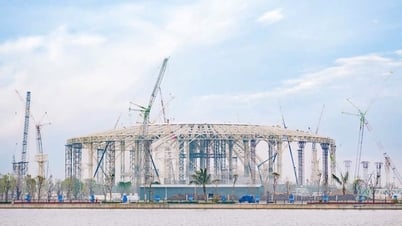The Vietnam Electricity Group (EVN)'s proposal to the Minister of Industry and Trade to report to the Prime Minister for permission to calculate the accumulated loss of VND44,792 billion into the average retail electricity price has raised many conflicting opinions.
Regarding this issue, VietNamNet had an interview with Mr. Nguyen Tien Thoa, Chairman of Vietnam Valuation Association, former Director of Price Management Department ( Ministry of Finance ).
- In your opinion, is the proposal to allow Vietnam Electricity Group to include the accumulated loss of VND 44,792 billion in the average electricity price appropriate?
Mr. Nguyen Tien Thoa: I always have a consistent view that electricity prices must be implemented according to the following principles: ensuring compensation for production costs; calculating correctly and fully reasonable and valid costs along with the necessary profit level for reproduction and complying with legal regulations.
However, the problem is that if due to the subjectivity of the business, poor business performance, causing prices to not cover costs, leading to losses in production and business activities, then there is no discussion, the business will have to bear it.

In cases where, for socio -economic benefits, the State is forced to keep electricity prices lower than costs and prices, leading to negative cash flow (loss) is inevitable, and businesses cannot preserve State capital, then there needs to be appropriate solutions.
Handling this cash flow deficit caused by prices by gradually allocating it to electricity prices is not contrary to the principles of electricity price formation, is not inconsistent with the Electricity Law, and is not contrary to Clause 7, Article 4 of the 2023 Price Law, which stipulates that "Price formation factors include the entire actual cost, profit (if any) or loss (if any) of financial obligations as prescribed by law".
- So what are the necessary steps to audit and clarify the cause of EVN's accumulated loss of more than VND 44,000 billion to ensure transparency, avoid waste and loss, and convince people of the reasonableness of including this loss in electricity prices?
To create a consensus in society on the above issue, in my opinion, the first thing is to ensure transparency and rationality. To do so, the Ministry of Industry and Trade needs to clarify so that the public understands the legal provisions on the rights and principles of electricity price management.
In addition, it is necessary to clearly explain with honest and accurate data: the loss is due to objective reasons (the State sets the price lower than the correctly, fully, reasonably and validly calculated cost) or due to weaknesses in management when including unreasonable and invalid costs in the price.
On the audit side, it is necessary to clarify and verify the production and business results figures, financial reports and check whether the accounting is in accordance with regulations and immediately remove incorrect contents, costs, and revenues and expenditures from the audit results.
In addition, it is necessary to control which costs are included in the price and which are not; whether the costs included in the price are guaranteed to be correct, sufficient, reasonable, and valid according to regulations (must have invoices, documents, and economic and technical norms).
On that basis, find out the reasonable cost level (excluding unreasonable costs) compared to the selling price and publicly announce it according to regulations.

- In the context of EVN proposing to include the loss in the electricity price, there are opinions that there are two scenarios: the State covers the loss with the budget or allows the electricity price to increase. Which option has less negative impact on the economy and the people, sir?
Vietnam's goods and services pricing mechanism in general and electricity pricing mechanism in particular are operating according to the market price mechanism, breaking away from the subsidized price mechanism and the policy of price compensation and loss compensation by the budget.
However, the State can have support policies on investment, taxes, interest rates... in specific cases to help limit excessively high electricity price increases, which have adverse impacts on life, production and business, and stabilize the macro economy.
I emphasize once again that electricity prices must follow the principle of correct and adequate calculation, associated with a number of social security policies (besides price) such as electricity support for poor households.
- Can EVN's proposal to amend Decree 72 on the mechanism for adjusting average retail electricity prices fundamentally solve the group's financial problems, or is it just a temporary "fire-fighting" solution? In your opinion, what additional policies are needed to ensure EVN's sustainable operations and avoid future deficits?
Amending Decree 72 according to the principle of correctly and fully calculating reasonable and valid costs into prices to avoid cases of cash flow imbalance is a fundamental step to solve EVN's financial balance problem.
Besides, EVN must implement solutions to optimize costs, administration, modernization, improve investment efficiency and cost management efficiency.
The Ministry of Industry and Trade recently submitted a Document to the Government on the Draft Decree amending and supplementing Decree 72/2025/ND-CP dated March 28, 2025 of the Government on the mechanism and time for adjusting average retail electricity prices. Notably, in the submission, the Ministry of Industry and Trade cited EVN's report showing that in the 2022-2023 period, the group's accumulated loss was about VND50,029 billion. By the end of 2024, this figure decreased to VND44,792 billion. Therefore, EVN recommends that the Minister of Industry and Trade report to the Prime Minister for permission to calculate this accumulated loss as a cost allowed to be included in the average retail electricity price. Other costs that have not been fully included in the electricity price are also proposed to be allocated, including costs directly serving electricity production and supply determined according to annual audited financial reports from 2022 onwards. EVN proposes an allocation plan, reports to the Ministry of Industry and Trade for consideration, and if necessary, consults with the Ministry of Finance. In addition, there are unallocated revaluation exchange rate differences and unpaid exchange rate differences for power plants under power purchase agreements. |
Source: https://vietnamnet.vn/ong-nguyen-tien-thoa-chi-ro-nguyen-tac-xu-ly-khoan-lo-hon-44-000-ty-cua-evn-2434093.html



![[Photo] Red flag with yellow star flutters in France on National Day September 2](https://vphoto.vietnam.vn/thumb/1200x675/vietnam/resource/IMAGE/2025/8/28/f6fc12215220488bb859230b86b9cc12)

![[Photo] Politburo works with the Standing Committee of Cao Bang Provincial Party Committee and Hue City Party Committee](https://vphoto.vietnam.vn/thumb/1200x675/vietnam/resource/IMAGE/2025/8/28/fee8a847b1ff45188749eb0299c512b2)
![[Photo] General Secretary To Lam presents the 45-year Party membership badge to comrade Phan Dinh Trac](https://vphoto.vietnam.vn/thumb/1200x675/vietnam/resource/IMAGE/2025/8/28/e2f08c400e504e38ac694bc6142ac331)
![[Photo] General Secretary To Lam attends the opening ceremony of the National Achievements Exhibition](https://vphoto.vietnam.vn/thumb/1200x675/vietnam/resource/IMAGE/2025/8/28/d371751d37634474bb3d91c6f701be7f)
![[Photo] Prime Minister Pham Minh Chinh meets with Speaker of the New Zealand Parliament Gerry Brownlee](https://vphoto.vietnam.vn/thumb/1200x675/vietnam/resource/IMAGE/2025/8/28/cec2630220ec49efbb04030e664995db)




























































































Comment (0)